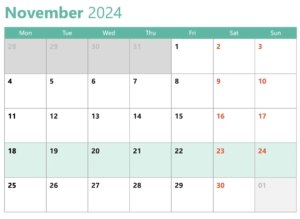7 days in healthcare (November, 18th-24th, 2024)

Summary
The most impactful news in health this week were:
- Biomedicine: the results of the ambitious Human Cell Atlas project appear.
- Global health: final agreement at COP29, by which rich countries will finance those with fewer resources in the fight against climate change, but only from 2035.
- International health policy: Trump’s appointments in health – generally anti-vaccine and anti-lockdown people during the pandemic – foreshadow great changes.
- National health policy: the debate and the unknowns about the continuity of MUFACE continue. No less important news in Navarra: according to the draft of the new law of the Navarra Health Service, new staff additions will be based on the labor regime.
Biomedicine
- A Human Cell Atlas appears, which is compared to Wikipedia. The project was launched in 2016 by biologists Aviv Regev, from Genentech, and Sarah Teichman, from the University of Cambridge, together with more than a hundred other scientists. They aim to catalogue every type of cell in the human body, from development to ageing. It is estimated that 37.2 “trillion” (American) cells have been catalogued. This week this initiative is presenting the first studies. This project would not have been possible without the Human Genome Project, and the NIH Brain Initiative. This is presented as a catalogue of every type of cell in our body, which will allow us to understand certain processes of inflammation or tumour development.
Global Health
- Pact in extremis at COP29 to finance climate action in poor countries. They will allocate 300 billion dollars a year from 2035. The agreement leaves a bittersweet taste and has been received with harsh criticism by social organisations, who call it “disappointing”.
International health policy
- Trump’s choices for Health Agencies suggest that a radical change is coming. Elections of anti-vaccines, opposed to lockdowns in the pandemic and contrary to conventional medical thinking. What a survey shows is that after the pandemic that killed more than a million Americans, many Americans have lost confidence in science and medicine.
- President Petro’s battle against the EPSs in Colombia continues. The Health Superintendency intervenes in the EPS Coosalud, the fifth largest in Colombia. It is the eighth EPS that the government of Gustavo Petro takes control of, which has sought to eliminate this figure through a debated and so far failed legal reform. The EPS Coosalud has more than 3.2 million members. Among the entities that the State has taken possession of are large institutions such as the private Sanitas, the mixed Nueva EPS or Famisanar.
National Health Policy (Spain)
- The disasters continue after the DANA in the Valencian Community. The struggle of the Dana peoples: 16,000 children without schooling, 2,150 uninhabitable houses; health risks; and a huge economic hole. The public health risks due to floods are still latent.
- MUFACE’s continuity in doubt. In what appears to be a fight between the Ministry of Public Administration and the Ministry of Health, the former asks the insurers at what price they would be willing to provide the service, announcing a new tender. On the other hand, the public procurement court paralyses the awarding of the MUGEJU and ISFAS tenders, following a demand from UNIPROMEL. CSIF announces a large mobilisation on 14 December, in defence of the MUFACE model.
- No more new statutory employees in the Navarre Health Service. According to the provisions of the Navarre Health Service Bill, which establishes that new additions would be as “permanent labour personnel”. The unions, as could not be otherwise, oppose it. Always defending the “tenured position”, one of the scourges of the system.
Companies
- International
- Johnson & Johnson threatened in the United Kingdom, with demands on talcum powder.
- National
- Biosim reminds us that future savings from biosimilars require an attractive market. Biosimilars generated savings of 1.8 billion euros in 2023 in Spain and projections estimate that this could add up to 22.295 billion by 2030. However, experts warn that the sustainability of this market requires tax incentives, simplified regulation and balanced public purchasing strategies and a reduction in price pressure that guarantee the viability of companies.
Biomedicine
- A Human Cell Atlas has appeared, which is being compared to Wikipedia (Nature). The project was launched in 2016 by biologists Aviv Regev, from Genentech, and Sarah Teichman, from the University of Cambridge, along with more than a hundred other scientists. They aim to catalogue every type of cell in the human body, from development to aging. It is estimated that 37.2 “trillion” (American) cells have been catalogued. This initiative, the Human Cell Atlas, is presenting the first studies this week. This project would not have been possible without the Human Genome Project, and the NIH Brain Initiative. (https://www.nature.com/articles/d41586-024-03754-y). This is presented as a catalogue of every type of cell in our body, which will allow us to understand certain processes of inflammation or tumor development (The Economist): https://www.economist.com/science-and-technology/2024/11/20/scientists-are-building-a-catalogue-of-every-type-of-cell-in-our-bodies
- The health of children in the first 1,000 days. Many diseases that manifest in adulthood, such as hearing loss or neurocognitive problems, have been shown to have their origin in childhood (https://www.thelancet.com/journals/lancet/article/PIIS0140-6736(24)02553-4/fulltext)
- A new antibiotic resistance gene hidden in the microbiome has been discovered (https://elpais.com/salud-y-bienestar/2024-11-18/descubrimiento-un-nuevo-gen-de-resistencia-a-los-antibioticos-oculto-en-el-microbioma.html). Access to the original article: https://www.sciencedirect.com/science/article/pii/S092485792400298X
- A drug against schizophrenia could treat Alzheimer’s disease (https://www.abc.es/salud/enfermedades/farmaco-esquizofrenia-tratar-enfermedad-alzheimer-20241121143352-nt.html) Access to the original article: https://www.nature.com/articles/d41586-024-03707-5
Global Health
- An in extremis pact at COP29 to finance climate action in poor countries. They will allocate 300,000 million dollars a year from 2035. The agreement leaves a bittersweet taste and has been received with harsh criticism by social organizations, who call it “disappointing.” (https://www.lavanguardia.com/natural/20241123/10134552/cop-sortea-abismo-nueva-oferta-financiacion-climatica-europa-ee-uu.html)
International health policy
- USA
- The first round of drug price negotiations in Medicare. On August 15, the results of the price negotiations for 10 drugs with Medicare were presented, establishing a maximum price that will be applicable from 2026. With this, the USA joins other developed countries that negotiate the price of drugs in the public system. The CMS (Centers for Medicare and Medicaid Services) says that if the measure had been implemented in 2023 it would have meant a savings of 6 billion dollars, a 22% reduction in Medicare spending on these drugs (https://www.nejm.org/doi/full/10.1056/NEJMp2411265)
- Alcohol deaths have doubled in two decades in the USA, between 1999 and 2020. Alcohol-related deaths between the ages of 25 and 85 have risen from just under 20,000 in 1999 to nearly 50,000 in 2020. The study includes causes of death directly related to alcohol, not other alcohol-influenced causes, such as accidents (https://www.nytimes.com/2024/11/22/health/alcohol-deaths-americans.html). Access to the original article in the American Journal of Medicine: https://www.amjmed.com/article/S0002-9343(24)00704-6/abstract
- Overdose deaths are declining, due to changes in the way drugs are supplied (https://www.nytimes.com/2024/11/21/health/overdose-deaths-decline-drug-supply.html)
- Trump’s choices for Health Agencies suggest a radical change is coming. Choices of anti-vaccines, opposed to contact restrictions in the pandemic and contrary to conventional medical thinking. What a survey shows is that after the pandemic that killed more than a million Americans, people have lost confidence in science and medicine (https://www.nytimes.com/2024/11/23/health/trump-kennedy-health-agencies-vaccines-covid.html). Access to Pew Research Center survey: https://www.amjmed.com/article/S0002-9343(24)00704-6/abstract
- Medicaid may face major cuts and work requirements. New Republican policies may weaken Medicaid funding, which led to an increase of 23 million people covered since Obamacare (https://www.nytimes.com/2024/11/20/health/medicaid-cuts-republican-congress.html)
- United Kingdom and the National Health Service
- Hospitals will monitor doctors’ use of WhatsApp for security reasons. This is done after verifying that the staff makes extensive use of WhatsApp, to share confidential clinical information (https://www.ft.com/content/f428e4ff-4dd9-4613-8485-dfc77fa154ec)
- Colombia
- The Health Superintendence intervenes the EPS Coosalud, the fifth largest in Colombia. It is the eighth EPS that the government of Gustavo Petro takes control of, which has sought to eliminate this figure through a debated and so far failed legal reform. The EPS Coosalud has more than 3.2 million members. Among the entities that the State has taken possession of are large institutions such as the private Sanitas, the mixed Nueva EPS or Famisanar (https://elpais.com/america-colombia/2024-11-22/la-superintendencia-de-salud-interviene-la-eps-coosalud-la-quinta-mas-grande-de-colombia.html)
National health policy
- The flood disaster in the Valencian Community
- The struggle of the Dana people: 16,000 children without schooling, 2,150 uninhabitable houses; health risks; and a huge economic hole. The public health risks due to the floods are still latent (https://elpais.com/espana/2024-11-24/la-lucha-de-los-pueblos-de-la-dana-16000-ninos-sin-escolarizar-2150-casas-inhabitables-riesgos-sanitarios-y-un-enorme-agujero-economico.html)
- Central government initiatives
- Health rules out appealing the court decision on plastic surgery. The Ministry says it is working on new regulatory measures (https://www.elperiodico.com/es/sociedad/20241122/sanidad-recurrir-prohibicion-ejercer-especialistas-cirugia-estetica-111947994)
- The cybersecurity strategy for the SNS will be launched in 2025, which is announced after the OECD warned in its Health at a Glance 2023 report that Spain lacked a cybersecurity strategy in the health system (https://www.elespanol.com/invertia/observatorios/sanidad/20241122/estrategia-ciberseguridad-sistema-nacional-salud-vera-luz/902660065_0.html)
- Vapes will only taste like tobacco and will carry health warnings. Draft of the new regulations, which may receive contributions until December 13 (https://www.abc.es/sociedad/vaper-solo-sabran-tabaco-llevaran-advertencias-sanitarias-20241122043422-nt.html)
- Congress approves the tax reform with new taxes on the pharmaceutical industry, as it establishes a global minimum tax of 15% for multinational companies with a turnover of more than 750 million euros. The measure was approved by the PSOE and its partners, with the PP voting against (https://www.consalud.es/industria/congreso-aprueba-reforma-fiscal-impuestos-industria-farmaceutica_151450_102.html)
- Initiatives and news from the autonomous communities
- The health unions present a multi-million-dollar lawsuit to the community of Madrid, for not having an occupational risk plan (https://elpais.com/espana/madrid/2024-11-21/los-sindicatos-sanitarios-se-unen-en-una-demanda-millonaria-a-la-comunidad-de-madrid-por-no-tener-un-plan-de-riesgos-laborales.html)
- The SESPA opens 22 new oral health clinics in Asturias. The aim is to reach 99 in 2025 (https://www.consalud.es/dentalia/pacientes-casos/sespa-abre-22-nuevas-consultas-salud-bucodental-en-asturias_151302_102.html)
- The new Navarra Health Law. The unions oppose the new staff joining the Navarrese Health Service as “permanent employees” (https://www.consalud.es/autonomias/navarra/nueva-ley-foral-salud-conseguira-navarra-sea-todavia-menos-atractiva-sanitarios_151459_102.html)
- MUFACE
- The government asks the insurers at what price they would provide their services to MUFACE, for which they will have 10 days (https://elpais.com/economia/2024-11-20/el-gobierno-pide-a-las-aseguradoras-que-precisen-a-que-precio-prestarian-el-servicio-de-muface.html)
- The public procurement court paralyses the health agreements of MUGEJU and ISFAS, due to a complaint by independent doctors. The resolutions of the Central Administrative Court of Contractual Appeals have their origin in two appeals filed by Unipromel (the Professional Medical Union Association, which represents independent physicians) against the specifications of the two tenders for the renewal of this coverage for 2025 and 2026. Its president, Ignacio Guerrero, has been battling against civil service mutual funds for some time. (https://elpais.com/economia/2024-11-22/crisis-de-muface-el-tribunal-de-contratacion-publica-paraliza-los-convenios-sanitarios-para-militares-y-jueces.html)
- CSIF announces a large mobilization in front of the MUFACE delegation in Madrid for December 14 in defense of MUFACE (https://www.consalud.es/profesionales/csif-anuncia-gran-movilizacion-14-diciembre-en-defensa-muface-mugeju_151472_102.html)
- Madrid, Andalusia and Valencia, the most affected communities in case of the elimination of MUFACE. In the last year, these three communities accounted for 55% of the assistance (https://www.plantadoce.com/publico/madrid-andalucia-y-valencia-las-comunidades-mas-afectadas-por-eliminar-muface)
- Sick leave
- The bill for sick leave between January and September 2024 reaches 12,000 million euros, 19% more than a year ago (https://www.vozpopuli.com/economia/empresas/la-factura-de-las-bajas-medicas-roza-ya-los-12000-millones-un-19-mas-que-hace-un-ano.html)
Companies
- International news
- Johnson&Johnson threatened with lawsuits in the UK over talcum powder (https://www.ft.com/content/374a5e20-eeb0-452b-9a8e-998e92af2e00)
- National
- Biosim reminds that future savings from biosimilars require an attractive market. Biosimilars generated savings of 1.8 billion euros in 2023 in Spain and projections estimate that up to 22.295 billion could be accumulated by 2030. However, experts warn that the sustainability of this market requires tax incentives, simplified regulation and balanced public purchasing strategies and a reduction in price pressure that guarantee the viability of companies. (https://diariofarma.com/2024/11/21/biosim-recuerda-que-el-ahorro-futuro-de-los-biosimilares-requiere-de-un-mercado-attractive)
This post is also available in: Spanish



